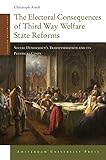The electoral consequences of third way welfare state reforms : social democracy's transformation and its political costs / Christoph Arndt.
By: Arndt, C. (Christoph) [author.].
Publisher: Amsterdam Amsterdam University Press 2021Description: 1 electronic resource (277 pages).ISBN: 9789048517213; 9789048517220.Subject(s): Welfare state -- Europe | Labor policy -- EuropeDDC classification: 306.094/09051 Online resources: Click here to access online Summary: In all advanced Western nations, policy-makers have implemented encompassing welfare state reforms in recent decades breaking with past welfare arrangements. In particular, social democracy engaged in significant policy change under the Third Way paradigm and broke with its traditional reputation on welfare that had built the ties with the core constituency in the 20th century. The Electoral Consequences of Third Way Welfare State Reforms: Social Democracy’s Transformation and its Political Costs provides a comparative study of the electoral consequences of Third Way welfare state reforms. The book demonstrates that Third Way reforms went against the social policy preferences of social democracy’s core voters and indeed produced an electoral setback for social democrats at the ballots. Moreover, and accounting for cross-national variation, the analysis shows that the nature of the setback is contingent on the electoral system and the party competition social democrats face when reforming the welfare state.| Item type | Current location | Call number | Status | Date due | Barcode |
|---|---|---|---|---|---|
 Books
Books
|
NASSDOC Library | 306.094/09051 CHR-E (Browse shelf) | Available | E-15 |
Includes bibliographical references (pages 249-273) and index.
In all advanced Western nations, policy-makers have implemented encompassing welfare state reforms in recent decades breaking with past welfare arrangements. In particular, social democracy engaged in significant policy change under the Third Way paradigm and broke with its traditional reputation on welfare that had built the ties with the core constituency in the 20th century. The Electoral Consequences of Third Way Welfare State Reforms: Social Democracy’s Transformation and its Political Costs provides a comparative study of the electoral consequences of Third Way welfare state reforms. The book demonstrates that Third Way reforms went against the social policy preferences of social democracy’s core voters and indeed produced an electoral setback for social democrats at the ballots. Moreover, and accounting for cross-national variation, the analysis shows that the nature of the setback is contingent on the electoral system and the party competition social democrats face when reforming the welfare state.
English


There are no comments for this item.